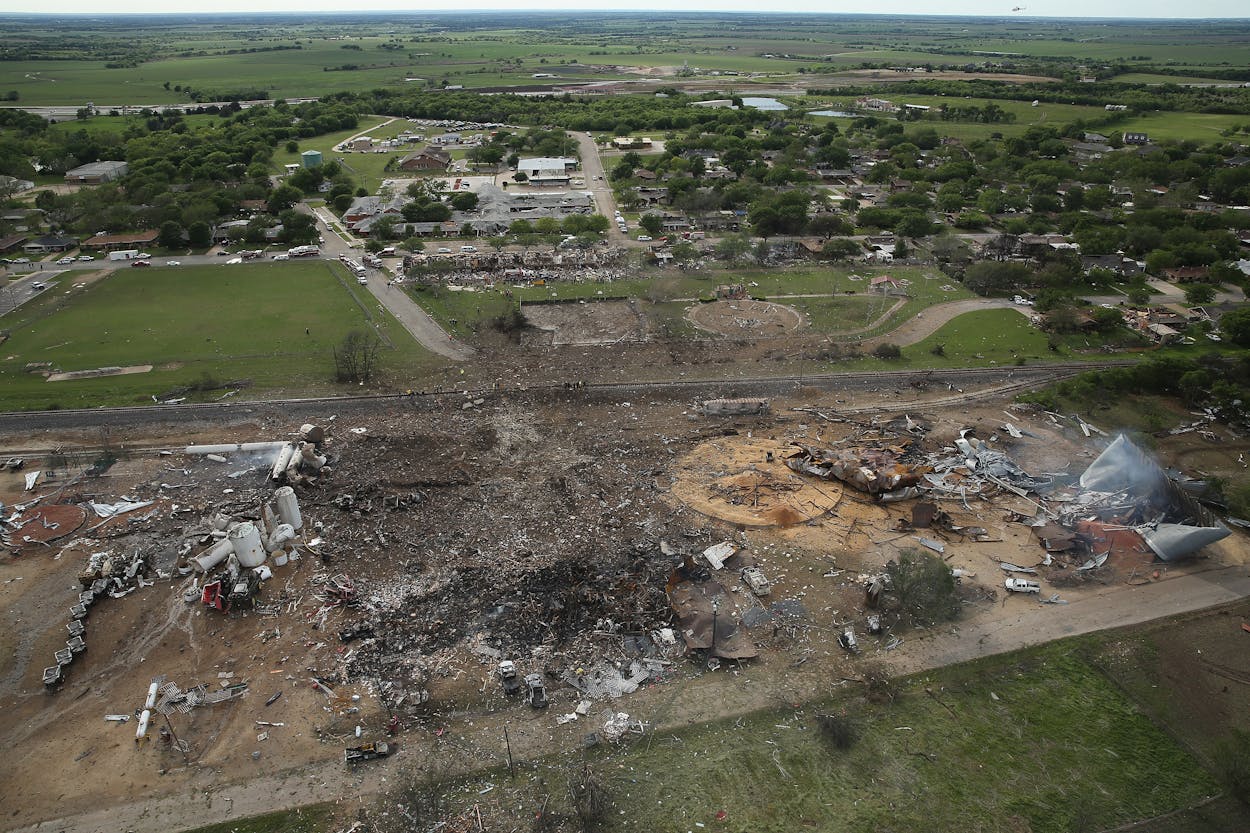Environmental Protection Agency head Scott Pruitt signed an order earlier this week delaying new safety regulations for chemical facilities. The regulations, which were originally set to go into effect on June 13, were drawn up under the Obama administration after a fertilizer plant in the Central Texas city of West exploded in 2013, killing fifteen people. In addition to pushing back the effective date to February 2019, Pruitt’s order blocks amendments that strengthened a rule requiring facilities that use highly hazardous substances to develop a risk management plan, which would require them to revise and resubmit it to the EPA every five years, according to the EPA’s website.
According to an EPA press release when the agency first announced the new rules in December, the amendments were meant to “prevent catastrophic accidents by improving accident prevention program requirements.” Additionally, the amendments aimed to increase coordination between facilities and the communities surrounding them and strengthen third-party audits. The new rules were an immediate reaction to the disaster in West. In August 2013, just four months after the explosion, President Obama signed an executive order calling on the EPA to strengthen safety regulations in order to prevent similar incidents in the future.
But there were concerns that the new regulations were too little and too late. According to the Center for Public Integrity, some environmental advocate groups felt that the rules did not go far enough, and were worried that the incoming Trump administration would rip the rules to shreds. Those fears likely multiplied when Trump plucked Pruitt from Oklahoma, where he served as attorney general and had made a reputation for himself as a pro-industry, anti-regulatory kind of guy, filing a bunch of lawsuits challenging a variety of EPA regulations. According to Bloomberg, Pruitt was also one of the most vocal opponents of these new chemical facility regulations, writing a letter in July 2016 objecting to the proposed rules, arguing that the transparency improvements would basically provide roadmaps to terrorists.
“The safety of these manufacturing, processing, and storage facilities should be a priority for us all,” Pruitt wrote in the letter, which was signed by ten other attorneys general. “But safety encompasses more than preventing accidental releases of chemicals, it also encompasses preventing intentional releases caused by bad actors seeking to harm our citizens. Your proposed rule seeks to make readily-available to the public information that you believe might be useful to the public in the event of an accidental release of chemicals. . .compiling that information and making it easily accessible also aids those who might seek to cause an intentional release for nefarious purposes, by providing those bad actors with information that would help them both select a target and exploit any security vulnerabilities their target might have.”
Pruitt didn’t directly touch on the safety concerns in a brief statement about his order. “We are seeking additional time to review the [Risk Management Program], so that we can fully evaluate the public comments raised by multiple petitioners and consider other issues that may benefit from additional public input,” Pruitt said in a press release Monday. In February, Pruitt’s office received a petition from the “RMP Coalition,” a group of chemical industry advocates, lobbyists, and trade organizations, requesting Pruitt delay the regulations. Eleven states, including Texas, filed a similar petition in March. Opponents of the rules have argued that they would put an unfair burden on the industry and on state agencies tasked with enforcing the regulations. There had been several short-term delays enacted on these rules since Trump took office, but Pruitt’s latest order almost certainly means Obama’s tougher regulations will be scrapped entirely in place of newer, industry-friendly rules.
The U.S. Chemical Safety Board completed its investigation into the West explosion in January of last year, uncovering multiple safety failures and regulatory gaps that led to the disaster. “The CSB’s investigation of the West Fertilizer accident found significant gaps in information critical to first responders,” CSB Communications Manager Hillary Cohen said in an emailed statement in Wednesday. “The EPA’s proposed rule was in part a response to our findings and recommendations. In the final analysis, facility employees, communities and first responders should have adequate information to understand the risks inherent in such facilities, to ensure everyone’s safety.”
The timing of Pruitt’s decision comes as West continues to recover and rebuild after the explosion destroyed much of the surrounding neighborhood, including schools and a nursing home. Work began last month on a memorial to honor those killed in the blast. According to the Austin American-Statesman, the Fallen Heroes Memorial in West will feature a reflecting pool with an eternal flame, encircled by plaques honoring the twelve first responders and three residents who died during the disaster. The memorial is expected to be completed by the end of the summer. “There’s always been a big interest, not only from the community, in letting it be known what those first responders did for the town,” memorial committee chairman Joe Pustejovsky said. Pustejovsky lost his son, Joey, who was responding to the fire. “In a situation like this where it’s such a tragedy, where so many people rushed to the defense of the town, we don’t want that to be forgotten.”
- More About:
- Energy






